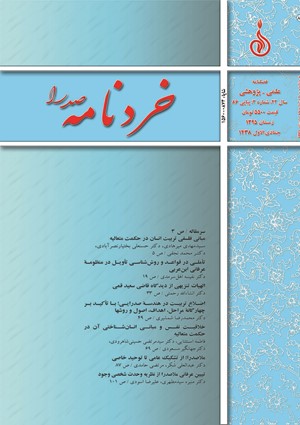اضلاع تربيت در هندسة صدرايي؛ با تأكيد بر چهارگانة مراحل، اهداف، اصول و روشها
محورهای موضوعی : ملاصدراپژوهی و اندیشۀ حکمت متعالیه
1 - دانشکده علوم انسانی
کلید واژه: تعليم وتربيت حكمت متعاليه مباني فلسفي اصول و روشها اهداف واسطهيي ,
چکیده مقاله :
حكمت صدرايي، حاوي ديدگاهي نوين دربارة انسان و ابعاد وجودي اوست كه ميتواند مبناي تبيينهاي تربيتي مبتني بر رويكرد اسلامي باشد. بدينمنظور، اين جستار در صدد است با شيوة تحليلي ـ استنتاجي، ضمن تبيين ديدگاه صدرالمتألهين دربارة تربيت اخلاقي ـ همراه با توضيح و تبيين اجمالي مقولههاي مطرح در اينباره، بر اساس نظريات او دربارة نفس، بعنوان مبناي تعليم وتربيت ـ به دلالتهاي تربيتي و نتايج بدست آمده با تأكيد بر چهار بخش مراحل، اهداف، اصول و روشهاي تعليم وتربيت بپردازد. در اينجا توجه به هدف غايي تربيت اخلاقي يعني مكاشفة حق و اهداف واسطهيي شامل تربيت انسان در مراحل نفس نباتي، حيواني و انساني، بررسي تلازم مباني فلسفي موجود در حكمت متعاليه با اصول تربيتي و نيز پرداختن به روشهاي تربيت اخلاقي شامل پرورش قواي حسي، تخيل و عقل اجتنابناپذير خواهد بود.
Sadrian philosophy presents a new approach to human beings and their ontological dimensions, which can be used as a foundation for developing educational theories based on an Islamic point of view. Hence, while explaining Mulla Sadra’s view of moral training along with a short illustration of the related categories and using an analytic-deductive method, this study aims to draw on his theories regarding the soul as the basis for education and training in order to examine his educational denotations and conclusions with an emphasis on educational stages, objectives, principles and methods. Here, it is necessary to pay attention to the ultimate goal of moral training, that is, unveiling the truth and the related intermediate goals, including training human beings at the vegetative soul, animal soul, and human soul stages. To attain the purpose of this study, it is also of prime importance to explore the necessary interrelations between the philosophical principles of the Transcendent Philosophy and educational principles and also examine the different methods of moral training including the development of sensation, imagination, and rational faculties.
